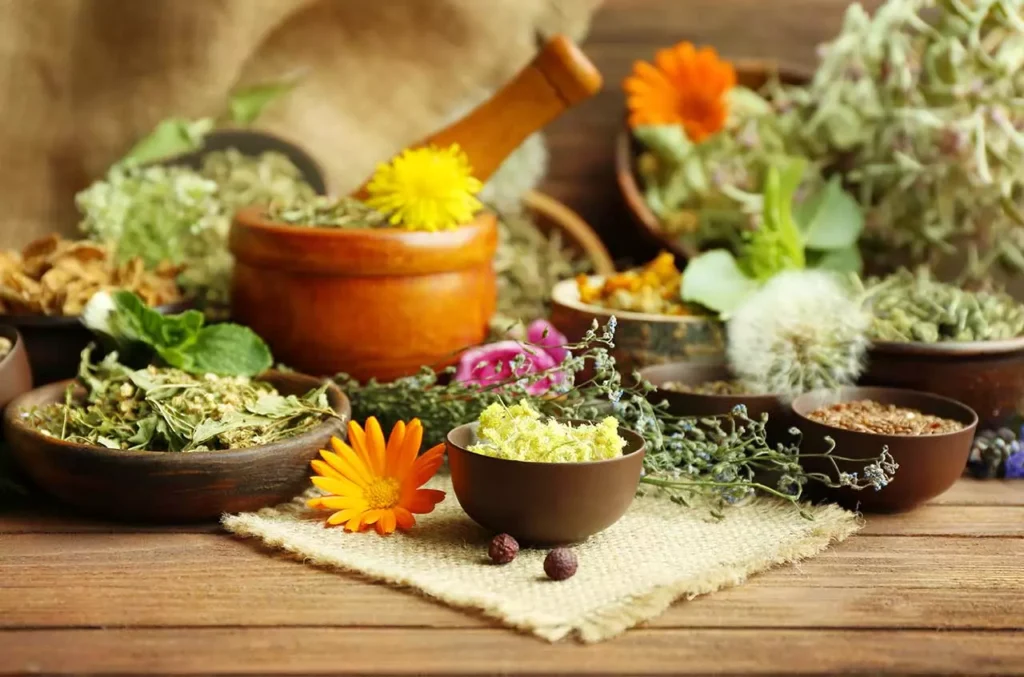In an age where modern medicine dominates healthcare, the herbal medicines and their uses offers a gentle reminder of nature’s potent healing abilities.
These natural solutions, derived from plants, have been nurturing human health for centuries, supporting bodily functions and aiding in the recovery from ailments.
As we seek more holistic approaches to wellness, the wisdom encapsulated in herbs presents a valuable resource for enhancing our health naturally.
The Foundation of Herbal Medicine
Herbal medicine, with its roots deeply entrenched in human history, has served as the cornerstone of therapeutic practices across civilizations.

From the lush gardens of ancient Egypt to the medicinal practices of Indigenous tribes, herbs have been revered for their healing properties.
Today, as we navigate a world abundant in synthetic solutions, the simplicity and efficacy of herbal remedies are gaining renewed appreciation for their minimal side effects and sustainability.
The integration of herbal medicine into modern wellness routines is not just a nod to tradition, but a scientifically supported approach to health.
Research continues to unveil the biochemical mechanisms through which herbs act, offering insights into their role in preventing disease and promoting health. This fusion of ancient wisdom and contemporary science paves the way for informed use of herbal remedies.
Key Herbal medicines and Their uses
Embarking on a journey through nature’s apothecary reveals a treasure trove of herbal remedies, each with unique properties and health benefits.
These natural wonders, derived from the earth’s flora, have been harnessed by civilizations throughout history for their healing powers.
In this section, we delve into the key herbal remedies that stand out for their remarkable ability to enhance well-being and promote natural healing. From boosting the immune system to combating inflammation, these herbs offer a glimpse into the potential of plant-based medicine to transform our health.
Echinacea
Echinacea, often hailed as the cornerstone of herbal immune support, thrives in the gardens of those seeking to fortify their body’s defenses naturally.
Its rise to prominence is backed by numerous studies suggesting its efficacy in reducing the duration and severity of common cold symptoms.
This herb’s immune-boosting prowess is attributed to its complex mix of phytochemicals, which work synergistically to enhance the body’s immune response. Incorporating Echinacea into your wellness routine during flu season or at the onset of a cold can provide a natural boost to your immune system, potentially curtailing the ailment’s impact.

Beyond its immune-supportive qualities, Echinacea has been explored for its role in skin health, particularly in wound healing and reducing inflammation. Its antimicrobial properties make it a valuable ally in natural skincare formulations, promoting faster recovery of cuts and skin irritations.
Whether consumed as a tea, tincture, or topical application, Echinacea’s versatility in health and wellness underscores its enduring value in herbal medicine cabinets.
Turmeric
Turmeric’s golden hue is not just a staple in culinary traditions around the globe; it’s also a beacon of healing, revered for its anti-inflammatory and antioxidant capabilities.
The secret to Turmeric’s health benefits lies in curcumin, a compound that has been extensively studied for its potential to combat inflammation, a root cause of many chronic conditions.
By integrating Turmeric into your diet, you’re not just adding flavor; you’re infusing your meals with a potent, natural anti-inflammatory agent that can help alleviate pain and stiffness associated with inflammatory disorders.
The benefits of Turmeric extend beyond inflammation, its antioxidant properties are thought to play a role in protecting against oxidative stress and cellular damage, contributing to overall health and longevity.
Adding Turmeric to your daily routine, whether through supplements, as a spice in your cooking, or even as a latte, can offer a simple yet effective means of harnessing its wide-ranging health benefits. As research continues to uncover the multifaceted effects of Turmeric on health, it stands as a testament to the power of herbal remedies in promoting well-being.
Safety and Dosage Considerations of natural herbs
Navigating the world of a list of herbal medicines and their uses requires a mindful approach, especially when it comes to dosing and safety.
Herbs are powerful, and their interactions with medications or conditions can be complex. It’s crucial to consult healthcare professionals before incorporating new herbal remedies into your regimen. This ensures that you benefit from their healing properties without risking adverse effects.
Tips for Incorporating Herbal Remedies into Your Daily Routine
Incorporating herbal remedies into your health routine doesn’t have to be complicated. Start with simple additions, like herbal teas or supplements, and pay attention to how your body responds. Integrating herbs into your diet through cooking is another excellent way to reap their benefits regularly.
Navigating the World of Herbal Supplements
Choosing high-quality herbal supplements is key to ensuring you’re receiving the full benefits of herbal medicine. Search for products with transparent ingredient sourcing and third-party testing to avoid contaminants and ensure potency.
Conclusion
The exploration of herbal remedies like Echinacea and Turmeric reveals the depth of nature’s pharmacy. These herbs offer more than just temporary relief; they provide pathways to holistic health that align with the body’s natural processes.
As we continue to uncover the myriad ways in which herbal remedies can enhance our well-being, it becomes clear that integrating herbal wisdom into our lives can lead to profound health benefits.
Embrace the healing power of nature by exploring the rich world of herbal remedies. Start with Echinacea and Turmeric, and discover how these ancient herbs can support your journey toward optimal health.
Frequently Asked Question About Herbal Medicines and their uses
Can herbal remedies replace conventional medicine?
While herbal remedies can complement conventional treatments, they should not replace them without consulting a healthcare professional. They are best used as part of a holistic approach to health.
How long does it take for herbal remedies to work?
The effects of herbal remedies vary depending on the herb and the individual. Some may provide relief relatively quickly, while others may need to be taken consistently over time to observe benefits.
Are there any side effects to using herbal remedies?
Like any treatment, herbal remedies can have side effects, especially if not used correctly. It’s important to follow dosage recommendations and consult a healthcare professional, especially if you have existing health conditions or are taking other medications.



